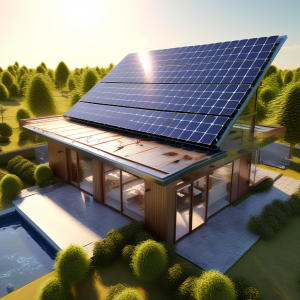In today’s world, where climate change and environmental concerns are at the forefront, finding sustainable and clean sources of energy has become more important than ever. One such solution that has gained significant popularity is solar electricity. Harnessing the power of the sun, solar electricity offers a cleaner and more stable alternative to traditional energy sources. In this article, we will explore the benefits of solar electricity and why it is worth embracing for a greener future.
Solar electricity, also known as photovoltaic (PV) energy, is generated by converting sunlight into electricity using solar panels. These panels consist of photovoltaic cells that absorb sunlight and convert it into direct current (DC) electricity. This DC electricity is then converted into alternating current (AC) electricity through an inverter, making it suitable for use in homes, businesses, and even the grid.
The sun, our ultimate source of energy, provides an abundant and renewable supply of power. Unlike fossil fuels, which are finite and contribute to greenhouse gas emissions, solar energy is clean and sustainable. By harnessing the power of the sun, we can reduce our dependence on non-renewable energy sources and mitigate the harmful effects of climate change.
Benefits of Solar Electricity
1. Clean and Renewable
Solar electricity is a clean and renewable source of energy. It does not produce any greenhouse gas emissions or air pollutants during its operation. By switching to solar power, we can significantly reduce our carbon footprint and contribute to a cleaner and healthier environment.
2. Cost Savings
Investing in solar electricity can lead to substantial cost savings in the long run. While the initial installation cost may seem high, solar panels have a lifespan of 25-30 years and require minimal maintenance. By generating your own electricity, you can reduce or even eliminate your monthly utility bills. Additionally, some governments offer incentives and tax credits for installing solar panels, making it a financially viable option.
3. Energy Independence
By embracing solar electricity, you can gain energy independence. Traditional energy sources are subject to price fluctuations and geopolitical tensions, which can impact energy prices. With solar power, you can generate your own electricity and reduce your reliance on external energy sources. This provides stability and security in the face of uncertain energy markets.
4. Grid Resilience
Solar electricity can enhance the resilience of the electrical grid. During power outages or natural disasters, solar panels with battery storage can provide backup power, ensuring that essential appliances and systems continue to function. This decentralized approach to energy production reduces the strain on the grid and increases its overall reliability.
5. Job Creation and Economic Growth
The solar industry has the potential to create jobs and stimulate economic growth. As more individuals and businesses embrace solar electricity, there is a growing demand for solar panel installation, maintenance, and manufacturing. This creates employment opportunities and contributes to the development of a sustainable green economy.
Frequently Asked Questions (FAQ)
Q1: How do solar panels work?
Solar panels work by harnessing the energy from the sun. The photovoltaic cells in the panels absorb sunlight and convert it into electricity. This electricity can be used to power homes, businesses, or fed back into the electrical grid.
Q2: Are solar panels expensive?
While the initial cost of installing solar panels may seem high, they offer long-term cost savings. Over time, solar panels can significantly reduce or eliminate your monthly utility bills. Additionally, there are various financing options and government incentives available to make solar panels more affordable.
Q3: Can solar panels work in cloudy or cold climates?
Solar panels can still generate electricity in cloudy or cold climates, although their efficiency may be slightly reduced. Advances in technology have made solar panels more efficient in capturing sunlight, allowing them to produce electricity even in less-than-ideal conditions.
Q4: What is net metering?
Net metering is a billing arrangement that allows solar panel owners to receive credits for any excess electricity they generate. When your solar panels produce more electricity than you consume, the excess energy is fed back into the grid, and you receive credits on your utility bill. This allows you to offset the cost of electricity when your panels are not producing enough power.
Q5: How long do solar panels last?
Solar panels have a lifespan of 25-30 years. With proper maintenance and care, they can continue to generate electricity efficiently for several decades. Regular cleaning and inspections can help ensure their longevity and optimal performance.
Conclusion
Solar electricity offers a cleaner, more sustainable, and stable source of energy. By embracing solar power, we can reduce our carbon footprint, save on energy costs, and contribute to a greener future. With advancements in technology and government incentives, solar panels have become a viable and financially beneficial option for both individuals and businesses. So, let us harness the power of the sun and embrace solar electricity for a cleaner and more sustainable energy future.
Key terms: solar electricity, sustainable energy, solar panels, photovoltaic energy, renewable energy, clean energy, carbon footprint, cost savings, energy independence, grid resilience, job creation, economic growth.
Hypertext links:
– [solar electricity](https://en.wikipedia.org/wiki/Solar_power)
– [solar panels](https://en.wikipedia.org/wiki/Solar_panel)
– [photovoltaic energy](https://en.wikipedia.org/wiki/Photovoltaics)
– [renewable energy](https://en.wikipedia.org/wiki/Renewable_energy)
– [clean energy](https://en.wikipedia.org/wiki/Clean_energy)
– [carbon footprint](https://en.wikipedia.org/wiki/Carbon_footprint)
– [cost savings](https://www.energy.gov/energysaver/save-electricity-and-fuel/renewable-energy/solar)
– [energy independence](https://www.energy.gov/energysaver/save-electricity-and-fuel/renewable-energy/solar)
– [grid resilience](https://www.energy.gov/oe/services/technology-development/smart-grid/resilience)
– [job creation](https://www.seia.org/initiatives/solar-jobs-census)
– [economic growth](https://www.researchgate.net/publication/323601507_Economic_Growth_and_Solar_Energy_The_European_Union_Experience)
Bulleted list:
– Grid Resilience
– Job Creation and Economic Growth
Bulleted list:
– Solar panels work by harnessing the energy from the sun.
– Solar panels can still generate electricity in cloudy or cold climates.
– Net metering is a billing arrangement that allows solar panel owners to receive credits for any excess electricity they generate.
– Solar panels have a lifespan of 25-30 years.
– Regular cleaning and inspections can help ensure their longevity and optimal performance.
Stay tuned for more articles on sustainable energy and environmental topics.


 The Power of the Sun
The Power of the Sun
I was reading through some of your content
on this website and I think this site is rattling informative!
Continue posting.!